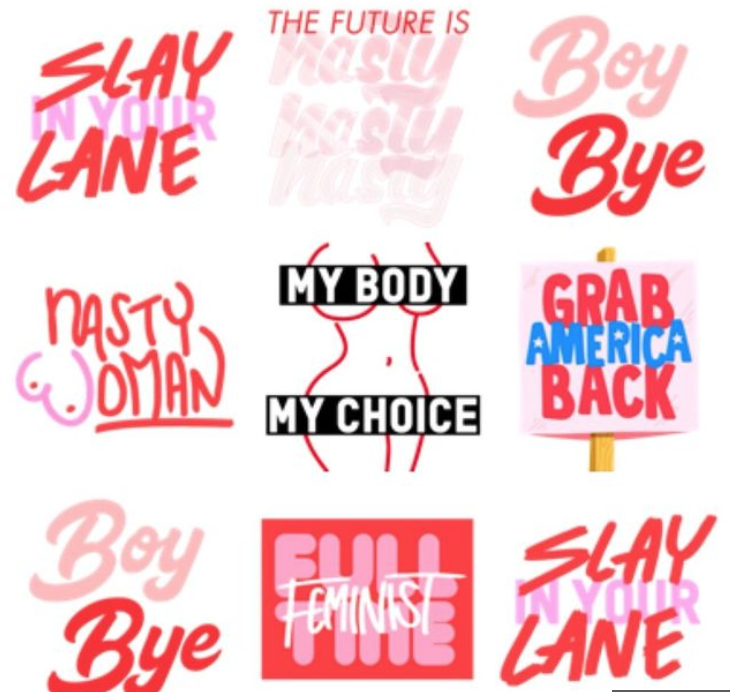When it comes to even normal emojis, things can tend to get scandalous with innuendo-laden dissection (the dictionary finally ceded to those with any lingering doubts that an eggplant means, as you already knew, a phallus). Thus, with Kimojis, very literal in their hyper-sexuality, the last thing one would have expected to cause controversy with Kim Kardashian’s latest addition to the suite, as it were, are icons and phrases symbolizing the current popular “trend” of feminism. When the separate from emojis brand was launched in late 2015, the available options consisted of her signature bum, the black barred rack that would become famous after she posted a nude selfie (one of the more memorable ones because it sparked tongue-lashings about her parenting skills–where was North West as she engaged in this vanity-driven photo session?) and a manicured middle finger, among more analog choices.
Now, almost three years later, it seems Kardashian has come a long way–or does it? Is this new grab bag of feminist-friendly Kimojis just a blatant testament to the reality star’s business acumen or does she genuinely give a fuck about the fair treatment of the fairer sex? Perhaps the answer lies somewhere in between, with Kim seeing fit to at least make a profit from the long-standing oppression and tokenization of women if there’s no real change to be had other than hollow Instagram and Facebook nods to International Women’s Day from men and those of still indeterminate gender.
Yet one of the many issues with this slew of themed Kimojis is also that Kardashian felt compelled to specifically tell fans and casual readers (though there’s no such thing as you have to pay for a subscription) of her blog back in 2016, “Why do we have to put labels on things? I’m a human being, and I have thoughts, feelings and opinions about a lot of different things.” Apparently those thoughts, feelings and opinions are merely a mirror of whatever society tells her they should be and have shifted toward the formerly shunned label of not just “feminist,” but “full time feminist,” as one Kimoji touts. And where the famed black bars once censored her tits and vag, we now see, “My Body, My Choice.” Ah, so rife with issues is the promotion of this sudden rebranding on the part of Kim K. And while, sure, a girl is allowed to change her viewpoints over time, there’s just something that feels a little too commodifying about this Kimoji pack. Elsewhere, Kim has opted for the phrases, “Slay in Your Lane,” “Boy Bye” (did Beyonce approve the use of her patented phrase?), Grab America Back (did feminists shading Trump approve the use of this patented phrase?), “The Future is Nasty Nasty Nasty” and “Nasty Woman” with a pair of breasts forming the W (did Hillary approve the use of her patented phrase?).
These sentiments, while marketing gold for the mongoloid audience of today, are not likely to have been found in the prose of Simone De Beauvoir or Betty Friedan, or on the protest signage of Gloria Steinem. Yet, sadly, maybe this is the best modern feminism can hope for. “Fast feminism,” as it were–the effortless ability to bark phrases at men pigeonholed as the natural enemy (which, to be frank, most of the time they are)–is the standard of now. And it’s been happening at a fever pitch ever since supporters of Hillary Clinton’s campaign grafted Trump’s “insult” toward her of being “such a nasty woman” for seeking to raise taxes on the rich during the debates. Women laughing both inwardly and outwardly at Trump’s so-called slander turned the “slam” into a positive catch phrase, shortened to just, “Nasty Woman.” Which can still be found on tote bags slung over the feminine arms of NYU and New School students on practically every street corner in New York.
Possibly seeing the value in the printability of this sort of thing, maybe the wheels began to turn in Kim’s head long before the release of this Kimoji pack, timed all too perfectly for release on March 8th, International Women’s Day. And if Kim learned anything from her mother, as she most certainly has, it’s how to capitalize on a zeitgeist. The problem is, when casual users of the word feminist start making money off of its trendability, the practice of the concept starts to feel a bit fuzzy–shallow, quite frankly. As though, all at once, misogynist men have been proven correct in their belief that to be a woman is to be frivolous, to glom onto anything that has a touch of sparkle and shininess to it. That, in short, cuts to the quick of why Kimojis “celebrating” feminism speaks to the rock bottom point America has hit with regard to how every cause of a political nature requires a celebrity presence to trumpet (no pun intended) it. Where are the women without “fame” attached to them? Why aren’t their voices being heard or broadcast?
While, no, there is nothing, “wrong,” per se, with Kardashian sharing this “chic” snapshot of feminism boiled down to a few keywords with her inexplicable fanbase, she is just one more example of the decreased meaning of “the doctrine advocating social, political and all other rights of women equal to those of men.” It feels evermore, in these bandwagon times, that it is no longer about that doctrine, so much as whether or not its definitions can be worn or sent via text fashionably.





















